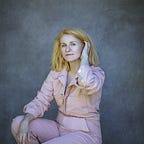Why we should all be fighter pilots and poets (or how my MA in Renaissance Lit prepared me for a career in tech)
This is a (cut down) TEDx Acorn Aspirations talk I gave in March 2016 for an audience of 16–18 year old girls, with a brief of “what you wish you’d known at 18”.
What was I like as a kid? I was a book nerd who made up dance routines, a child actor who loved dress up, a terrible artist who liked writing plays.
Which is funny, because my family weren’t like me at all. My dad’s a self taught information architect, my mum loved zoology, and my siblings have degrees in things like microbiology and computer science. I guess you could say I was the arty black sheep.
That artiness helped me define my character in opposition to my family, but it also reinforced stereotypes I’ve spent decades trying to unlearn. And education didn’t help, because it presented arts and science as things that were inherently different, two different languages and types of people, and made me choose.
Learning is fun and democratic, but education rarely is — mine certainly wasn’t. At fourteen, I had to drop geography in favour of history. Maybe I’ll never know what an oxbow lake is. For GCSEs, I slimmed down my science subjects so I could study two languages. Then I was told universities wouldn’t take my degree application seriously unless I had four arts A-levels. No STEM allowed.
I loved my degree in English Literature but, when I went into the working world, I found myself frustrated by the lack of interest my teammates had in technology. Because the thing is, I’d grown up playing this amazing game Monkey Island, full of problem solving and language play. Blogging, chat rooming and virtual friend-making since the early Nineties. I’d always loved chemistry experiments. My education had given me a clear path, into publishing and journalism and words…
And then I found a different way. People who work in user experience — how we enjoy and use products — call this the desire line. The path that may not be what we’re meant to do, but that innately makes sense. For me, that was taking my word skills and moving into the world of startups and technology.
When I was a kid, this is how I thought we lived — and how many of us thought life would and should be: you played until you were five or six, studied until 21 (I genuinely thought 21 would be when I stopped learning. I’ve learnt more in the last year than I think I did in all my time at university), worked for four decades then had some time off for golf.
This was what so we — me, my friends, my teachers, my parents friends-believed life looked life. It’s hard now to realise it hasn’t always been like this, that that notion of a career is really an invention of the last hundred years. That the weekend itself was the invention of Henry Ford (also the minimum wage).
But things change. I love this quote from 1977, just a few years before I was born: “There’s no way anyone would want a computer in their home”.
We’re living in such interesting times. An age of mass transformation. Where play, study, working and relaxing can co-exist. Where we increasingly value lifelong learning, and may have no expectations of set retirement age. Where teams can work collaboratively and as equals. Where offices may have beanbags and slides, and we’re motivated by causes and products we can truly believe in, rather than just our salary or a target retirement date.
But….is anything truly new? I did a masters degree in Renaissance literature — basically, Shakespeare’s friends. I got really excited about this thing called miscellany verse. Books were rare so people used to carry notebooks, and copy over their favourite poems and plays. Crucially, though, they’d alter these depending on what they liked: so, my Hamlet would be a redhead lady. How is this different from the endless creativity at work in Pepe memes on Tumblr?
The term “Renaissance man” or “Renaissance woman” means someone who is well rounded; excellent at more than one thing, and interested in many. Think Elizabeth I; strong leader, spoke many languages, crazy bright. It’s something I think we or maybe I lost sight of, for a long time, that people can and should be multidisciplinary. Think Ada Lovelace: she’s celebrated for her invention of computer programming but was also a gifted poet. The first spacewalk was done by Russian cosmonaut Alexey Leonov, who is also an amazing painter.
I’m here to argue passionately for arts graduates in tech and the new perspective they bring; I’m here to argue for thinking beyond the streams of arts and science that schools segment these into, and for keeping an open mind about who you are and what you love.
Because the best things happen at the point of convergence.
That’s why our cafe floor isn’t for fintech or fashiontech or any other vertical. Sometimes it can seem like London is full of amazing things…all happening behind closed doors. Our cafe is for developers, for designers, for those who are curious about what startups look like, and for founders working in a dizzying array of areas. Because so many of the questions you have starting up are the same, whether you’re in machine learning or marketing. Because the best inspiration comes just outside of what we already know.
Nobody can predict the future, but the teams based at Campus right now need both creative problem solving and deep technical skills.
I wish I’d known that, at eighteen. That I didn’t have to choose. That I could be both, or neither, and that work is as much about people and passion as it is about the formal skill behind it.
We’re living in a time of almost limitless possibility. Why limit ourselves?
